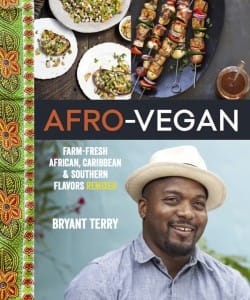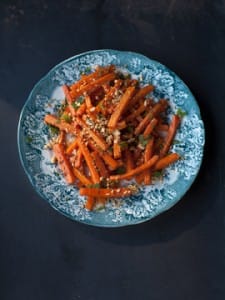by The People’s Minister of Information JR
You may have heard of Bryant Terry from one of the many books he has authored on healthy soul food. For every recipe in his books, he presents a music selection that inspired the dish. If you love soul food and you are trying to become more healthy, Bryant Terry is the man you need to study.

This time Chef Bryant Terry is teaming up with the Matatu Festival of Stories and is offering an opening night dinner – with spoken word artists Saul Williams and Donte Clark, along with visual artist Mahader Tesfai – on Tuesday, Sept. 22, from 7 to 10 p.m. at Miss Ollie’s, 901 Washington St. in Oakland. I wanted to sit down with one of Oakland’s frontline soldiers in the food justice and healthy soul food movement to put my ear to the ground. Check out Chef Bryant Terry in his own words.
M.O.I. JR: What are your first pleasant memories of food?
Bryant Terry: Spending time in the gardens of my grandparents as a child growing up in Memphis, Tenn.
M.O.I. JR: When did you start cooking? When did you know that you wanted to become a chef?
Bryant Terry: I have been cooking all my life. I started learning from my grandmother when I was around 7 years old. My work around health, food and farming is inspired by the food activism of the Black Panthers in the late ‘60s and ‘70s.
I knew I wanted to use cooking as a tool to politicize young people and excite them about becoming food justice activists when I was a graduate student in history in the late ‘90s.


M.O.I. JR: What chefs are you inspired by?
Bryant Terry: Edna Lewis, Jessica B. Harris, Michael W. Twitty, Roy Choi, Alice Waters
M.O.I. JR: In your cookbooks, you also include music selections in your recipes. Why?
Bryant Terry: I’m trying to bring the culture back in agriculture.
M.O.I. JR: What exactly is food justice? What role do you play in it?
Bryant Terry: Food justice is a movement to ensure that everyone is afforded the human right to healthy, safe, affordable and culturally appropriate food. I’m simply using my national platform to a) bring light to the economic, physical and geographic barriers that many people in communities across this country have to accessing good food and b) work to build power in those communities so folks can create solutions to food injustice.
M.O.I. JR: Why should the Black community in particular be interested in food justice?
Bryant Terry: African-Americans have some of the highest rates of preventable diet-related illnesses. We need to own and drive the solutions to food injustice and reclaim vibrant health and wellbeing.
M.O.I. JR: Can you tell us about your contribution to the upcoming Matatu Film Festival?
Bryant Terry: I will be spinning selections from my jazz vinyl collection, playing everyone from Duke Ellington to the Dirty Dozen Jazz Band.
M.O.I. JR: As a resident of Oakland, how would you like to see your work affect the youth of Oakland?
Bryant Terry: I want to continue to inspire young people to be leaders in the food justice movement and move people of all ages to grow, cook and eat real food and abandon processed, packaged and fast food.
The People’s Minister of Information JR Valrey is associate editor of the Bay View, author of “Block Reportin’” and “Unfinished Business: Block Reportin’ 2” and filmmaker of “Operation Small Axe” and “Block Reportin’ 101,” available, along with many more interviews, at www.blockreportradio.com. He can be reached at blockreportradio@gmail.com.






